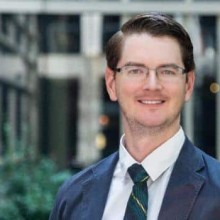Improving Nanophotonic Devices with Materials & Design
Nanophotonic technologies have burst onto the scene since the turn of the millennium, and have driven both fundamental and applied advances across application areas including nonlinear optics, integrated photonics, and compact optical devices to name just a few. However, as we seek to solve problems in these fields using the approaches made available through nanophotonics, several barriers remain such as loss, material limitations, and weak interactions. Thus, an important question becomes, can we address
the limitations of nanophotonics while maintaining the inherent advantages? In this presentation, we will overview our efforts in this space, where we seek to improve nanophotonic devices through materials and design. In particular, we will provide an overview of advances in plasmon-assisted devices for integrated photonics, robust metamaterials for everyday environments, and improved nonlinearities in epsilon-near-zero materials, while highlighting new areas of opportunity.

Dr. Nathaniel Kinsey
Engineering Foundation Associate Professor, Virginia Commonwealth University on March 7, 2023 at 10:15 AM in EB2 3001
Nate Kinsey received his Bachelor of Science in Electrical Engineering from the University of Missouri – Columbia in 2011. He followed with his Master of Science from the University of Missouri in 2012 where he researched optically activated solid-state switches for high-energy RF systems. Following, Nate moved to Purdue University to pursue his doctorate where he researched nonlinear optics, integrated nanophotonics, and plasmonics. In the fall of 2016 Nate joined the Dept. of Electrical & Computer Engineering at Virginia Commonwealth University where currently holds the title of Engineering Foundation Associate Professor. Since joining VCU his work has broadly focused on light-matter interactions in nanoscale devices and materials with key advances in epsilon-near-zero materials and integrated nanophotonic active devices. Over the years Nate received recognition for his research contributions including the Meissner Fellowship, the Bilsland Dissertation Fellowship, the Outstanding Graduate Research Award, the AFOSR Young Investigator Award, and the Engineering Foundation endowed faculty appointment.
The Department of Electrical and Computer Engineering, sometimes in conjunction with other NC State departments makes an ongoing effort to invite the brightest experts from academia, business, and research to come speak and share their ideas, experiences, and research with faculty, students, and alumni at NC State.
